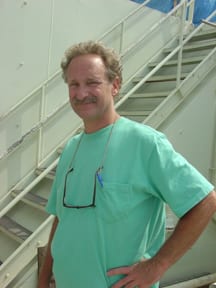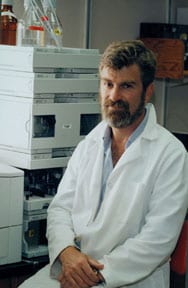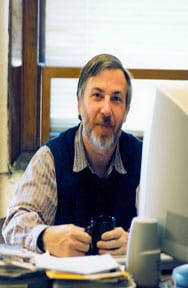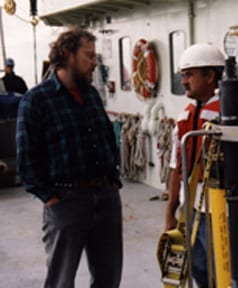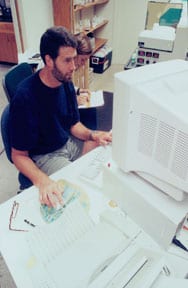Five WHOI Researchers Recognized for Contributions to Science and Education
December 14, 2004
Five researchers have been recognized by the Woods Hole Oceanographic Institution (WHOI) for their contributions to ocean sciences research and education. All will receive funding provided by the endowed awards to support their research over periods of three to five years. The awards are effective January 1, 2005.
Four of the researchers have been named recipients of endowed senior scientist chairs that provide financial support for five years, allowing the recipient the freedom to pursue a variety of career interests. One investigator received a technical staff award that provides support over three years.
Dr. Lloyd Keigwin is the first recipient of the Edna McConnell Clark Chair for Excellence in Oceanography, established this year in honor of longtime friend and Institution supporter Edna McConnell Clark. Clark Laboratory, the Institution’s largest research facility, is named in honor of Mrs. Clark and her late husband, W. Van Alan Clark, Sr. The Clarks were summer neighbors of the Institution in Woods Hole and helped found the Associates Program in 1952. The Clark Family has generously supported the people, programs, and facilities at WHOI for more than 50 years. Their gifts helped endow the Institution’s Joint Program in Oceanography and Oceanographic Engineering, a graduate degree program established in 1968 and conducted jointly with the Massachusetts Institute of Technology.
Keigwin is a senior scientist in the Geology and Geophysics Department and is well known for his research on the ocean’s role in climate change. A 1969 graduate of Brown University, he received a master’s degree in 1976 and a doctorate in 1979 in marine geology from the University of Rhode Island. He joined the WHOI staff in 1980 as an assistant scientist in the Geology and Geophysics Department, was promoted to associate scientist in 1984 and to senior scientist in 1993. Keigwin has participated in more than 20 major oceanographic research cruises around the world. In addition to his research, Keigwin also served in the US Naval Reserve, retiring in 1999 as a captain.
Keigwin’s research has focused on climate and oceanographic change based on studies of deep-sea sediments, with special emphasis in the western North Atlantic and the North Pacific oceans. Colleagues note that his contributions over the past few decades have been influential; Keigwin was among the first to document a change in Atlantic water mass properties during the last ice age, and is often the first to recognize a new research trend. He has been a catalyst for joint research among various disciplines at the Institution, and serves as chair of the scientific steering committee for the United Kingdom’s Rapid Climate Change Program.
Dr. James Moffett, recipient of the Mary Sears Chair for Excellence in Oceanography, received a bachelor’s degree in chemistry from the University of Otago in New Zealand in 1981 and a Ph.D. in chemical oceanography from the University of Miami in 1986. He joined the WHOI staff in 1986 as a postdoctoral scholar in the Marine Chemistry and Geochemistry Department, spent another year as a postdoctoral investigator, and was appointed assistant scientist in 1988. Moffett was promoted to associate scientist in 1993 and to senior scientist in 2001. He is the author or coauthor of more than 50 refereed scientific publications.
Moffett’s research has centered on photochemistry of natural waters, trace metal cycling and the impact of trace metal geochemistry on phytoplankton. His research interests and contributions range from new analytical approaches to controlled laboratory experiments to novel hypotheses concerning the impacts of trace metals like copper, iron and zinc on plankton in the open ocean. Colleagues note that “creative and innovative science” have been the hallmarks Moffett’s his career at WHOI, where he has encouraged more interaction between marine chemists and biologists and also mentored a number of graduate students.
The Sears chair is named for Dr. Mary Sears, one of the first staff members of the Institution and a guiding force in its development. A biologist, she also served as clerk of the Institution’s corporation for many years and was a major presence in uniting the international oceanographic community. She passed away in 1997 at the age of 92.
Dr. James Lynch, recipient of the Robert W. Morse Chair for Excellence in Oceanography, is a senior scientist in the Applied Ocean Physics and Engineering Department. He received a bachelor’s degree in physics from the Stevens Institute of Technology in 1972 and a Ph.D. in physics from the University of Texas at Austin in 1978. He joined the WHOI staff as an assistant scientist in 1982, was appointed associate scientist in 1986, and was named senior scientist in 1997.
Lynch’s research interests include underwater acoustics, with emphasis on shallow water and arctic acoustics, and acoustic tomography. Over the past two decades he has been a leader of an international community of experimental and theoretical acousticians, geologists and oceanographers pursuing shallow water acoustics. Colleagues note that he has been “an innovative and invaluable researcher” in the fields of acoustics, geology and physical oceanography, and has “paved the way to a better understanding of the complicated and many faceted problem of acoustic propagation in shallow water environments.”
Lynch has also been active in the Institution’s joint graduate program with MIT, teaching both ocean and seabed acoustics, and has worked to bring geologists, physical oceanographers, engineers and acoustic physicists together for productive research. The Morse chair is named for former Associate Director and Dean of Graduate Studies Robert Morse, a physicist with research interests in underwater acoustics, who passed away in 2001.
Dr. John Toole, recipient of the Columbus O’Donnell Iselin Chair for Excellence in Oceanography, is a senior scientist in the Physical Oceanography Department. He received a bachelor’s degree from the University of Maine in 1975 and a Sc.D. from the MIT/WHOI Joint Graduate Program in 1980. After a summer student fellowship at the Institution in 1974, he was appointed a graduate research assistant in 1975 and a postdoctoral investigator in 1980. In 1982 he was appointed an assistant scientist, was promoted to associate scientist in 1986 and to senior scientist in 1996.
Toole’s research interests include the physics of ocean mixing, global heat and freshwater budgets, water mass formation and circulation, and oceanographic instrument development. He holds several patents for profiling instruments, has served as oceans editor of the Journal of Geophysical Research, and has been a principal investigator on a number of international climate change programs.
Colleagues note that Toole “observes widely, measures new things, interprets well, is thoroughly informed about general principles and even develops new devices to add to the collection of instruments for the world community.” Toole has been active in mentoring junior staff, and participated in WHOI’s postdoctoral and graduate education programs. Earlier this year he was elected a Fellow of the American Geophysical Union, an honor given to less than one percent of AGU’s members.
The Iselin Chair is named for the Institution’s second director, first master of the Research Vessel Atlantis, and a physical oceanographer. A major force in American oceanography in the first part of the 20th century, Columbus Iselin appeared on the cover of Time magazine in 1959 in recognition of his many contributions to ocean science.
Lary Ball, a research specialist in the Marine Chemistry and Geochemistry Department, is the recipient of the Allyn Vine Senior Technical Award. He received a bachelor’s degree in chemistry from the University of Maine in 1973, and has spent much of his career applying analytical chemistry techniques to problems in marine chemistry. Ball joined the WHOI staff in 1974 as a research assistant, left in 1976 to work as a research chemist at the Rocket Research Corporation in Washington and as a research assistant at Oregon State University, and returned to WHOI in 1981 as a research assistant. He was promoted to research associate in 1986 and to research specialist in 1999.
Ball manages the Institution’s ICPMS facility (inductively coupled plasma mass spectrometry and emission spectrometry) and collaborates with chemist Dr. Kenneth Buesseler. Colleagues note that Ball’s ability as a facility manager and his technical skills have made the ICPMS an internationally recognized facility. He has mentored several graduate students and postdocs, and has trained other technical staff members to help them gained experience in using the analytical facility.
The Vine award is named for former WHOI physical oceanographer and visionary Allyn Vine, for whom the submersible Alvin is named. Vine was widely recognized as a leading proponent for manned exploration of the deep sea, and championed construction of other tools for the national community, often producing new techniques and unusual equipment. He passed away in 1993 at age 79.
It is awarded for a three-year period and is presented to a member of the Institution’s technical staff who “has distinguished himself or herself through extraordinary accomplishments in engineering, instrument development, information systems, or oceanography, and who has demonstrated a commitment to mentorship and partnership with junior technical staff members.” Nominations are solicited from the scientific and technical staff, with selection based on the individual’s record of excellence.
The endowed senior scientists chairs are each awarded for a five-year period to tenured members of the Institution’s scientific staff who have “distinguished themselves through extraordinary scientific research and education.” Nominations are solicited from the scientific staff, with selection based on the individual’s record of scientific excellence. The Institution’s Director and Executive Committee of the Board of Trustees approve the awards.
Woods Hole Oceanographic Institution (WHOI) is a private, independent marine research and engineering and higher education organization located in Falmouth, MA. Its primary mission is to understand the oceans and their interaction with the Earth as a whole, and to communicate a basic understanding of the ocean’s role in the changing global environment. Established in 1930 on a recommendation from the National Academy of Sciences, the Institution operates the US National Deep Submergence Facility that includes the deep-diving submersible Alvin, a fleet of global ranging ships and smaller coastal vessels, and a variety of other tethered and autonomous underwater vehicles. WHOI is organized into five departments, interdisciplinary institutes and a marine policy center, and conducts a joint graduate education program with the Massachusetts Institute of Technology.

